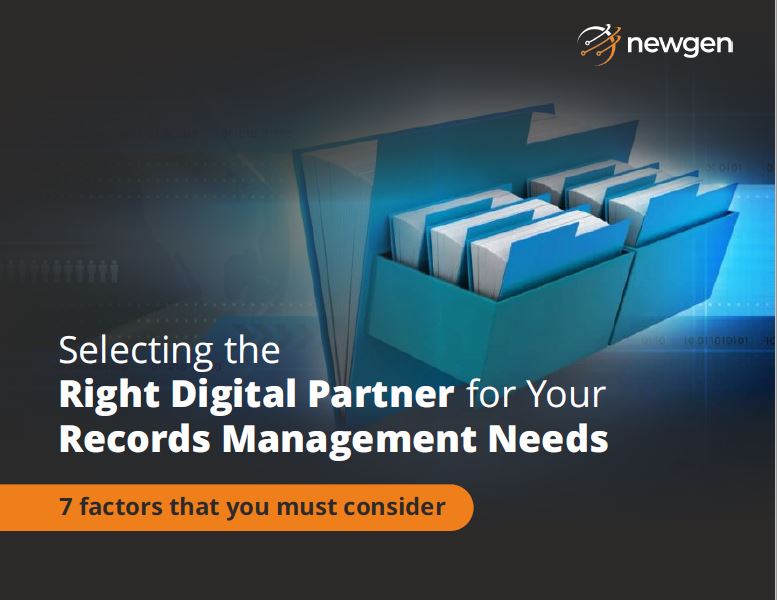Modernizing Governance for Secure, Scalable and Compliant Information
Government organizations today handle a massive volume of physical and digital records generated across departments, public services, and citizen interactions. These records contain valuable information that drives decision-making, operational continuity, transparency mandates, and compliance obligations. However, managing them manually or through fragmented legacy systems increases the risk of misplaced data, inefficient tracking, regulatory penalties, and rising storage costs.
Digital records management has become essential to improving governance, enhancing productivity, and achieving a secure, compliant information ecosystem. This eBook explores the most important factors organizations must consider while choosing a technology partner capable of delivering long-term sustainability, scalability, and trust across the public sector information lifecycle.
Why Digital Records Management Matters Today?
Records are no longer simple paper files stored in warehouses. They are critical operational assets. With citizens increasingly engaging online, the volume and diversity of digital content continues to surge. Government agencies must ensure:
- Fast access to information anytime
- Secure governance of sensitive public data
- Consistent compliance with evolving standards
- Long-term preservation of institutional memory
Digital transformation can only succeed when records are captured accurately, organized intelligently, and accessible without friction. A strong records management strategy enables both modernization and accountability.
The Risk of Selecting the Wrong System
Choosing a solution without due diligence can bring hidden challenges. Outdated or poorly integrated systems may:
- Slow down services and productivity
- Lack the security needed for classified or confidential records
- Fail to meet government-specific certifications
- Create data silos across departments
- Limit scalability as usage increases
- Demand high maintenance effort and training
Selecting the right partner is a foundational step in strengthening trust and compliance for the entire institution.
Seven Factors That Define the Right Technology Partner
The eBook outlines seven critical elements that must guide the selection of a digital partner:
1. Quality of the Records Management System
A reliable system ensures accuracy, integrity, and automation throughout the record lifecycle. Agencies should evaluate:
- Expertise of the technology provider
- Track record of success with similar customers
- Certifications such as DoD 5015.02 and ISO compliance
- System performance in large-scale environments
Quality determines long-term viability.
2. Productivity and Flexibility
The system must simplify tasks for employees and support collaboration. Key considerations include:
- Automated document and metadata capture
- Integration with productivity apps like Outlook and SharePoint
- Configurable workflows that match departmental needs
- Ability to streamline data flows across units
Flexibility ensures the solution adapts to evolving operations.
3. Scalability
Government services expand continuously. The platform must:
- Handle growing users and content volumes
- Support both physical and digital repositories
- Offer a modular, scalable architecture across machines
Scalability ensures future-readiness without reinvestment.
4. Testing and Implementation Confidence
Pilot testing must confirm real-world performance. Leaders should ask:
- Are the core features tested in actual agency environments
- Does the vendor provide proof of concept
- How smoothly does the system integrate with existing technology
Early validation minimizes implementation risks.
5. Security
Governments carry high accountability over sensitive records. The solution must enable:
- Centralized control with granular access rights
- Strong protection for cloud deployments
- Full audit trails to prove record authenticity
Security ensures compliance and prevents breaches.
6. Support for Every Record Format
Government information arrives in diverse formats. The platform must manage:
- Paper files through barcoding and digitization
- Electronic documents like PDF, JPEG, Excel
- Email and social media records with retention rules
Supporting all record types prevents data blind spots.
7. Training and Maintenance Support
User adoption drives success. A capable vendor must provide:
- Persona-based interfaces that reduce onboarding complexity
- Training programs for administrators, users, and archivists
- Easy access to help resources, user guides, and knowledge tools
Continuous skill support keeps transformation sustainable.
Putting the Pieces Together
Selecting the right partner is not just a technology decision. It is an operational and compliance imperative. A strong solution will:
- Improve accountability and responsiveness
- Support transparency and public trust
- Reduce delays in retrieving information
- Minimize risk of non-compliance with retention policies
- Eliminate dependence on paper archives that are costly to maintain
- Enable smarter use of knowledge resources
Better records management strengthens government credibility and capability.
The End-to-End Records Lifecycle
A complete digital solution should manage records from their creation to their legally authorized disposal or preservation. This includes:
- Capture and classification
- Secure storage and version control
- Fast retrieval through intelligent search
- Monitoring retention schedules
- Defensible destruction or measurable preservation
Lifecycle governance eliminates the possibility of unmanaged files or unauthorized access.
Why Government Agencies Cannot Wait?
Regulatory environments continue to evolve. Digital users expect faster services and streamlined processing. Delays in modernization increase the cost of operations and expansion risks. Strengthening records governance supports:
- Federal and regional compliance audits
- Transparent internal reviews
- Rapid response to citizen information requests
- Disaster recovery and business continuity efforts
Every step taken toward digital maturity improves resilience.
How Newgen Supports Government Records Transformation?
Newgen provides a digital automation platform that helps governments manage both physical and digital records securely and efficiently. The platform supports content capture, secure storage, automated retention, and unified access. With built-in compliance features and scalable architecture, organizations can modernize without disruptive replacements. Intelligent and centralized record governance creates operational clarity and protects information integrity.
Building a Secure and Future-Ready Records Landscape
Government organizations are entrusted with information that defines public history, accountability, and transparency. The right digital partner ensures that every record is managed responsibly, preserved accurately, and accessed confidently when needed. Modernization is no longer optional. It is central to strengthening public trust and improving the speed and quality of services delivered to citizens.
Now is the moment to align technology, governance, and operational excellence to build records management that supports transformation well into the future.

